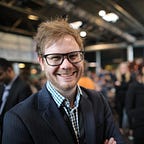Blockchain in the Nordic Model
The Blockchain: A global trust machine that disintermediates everything, removes bureaucracy and middle men and reduces the state’s impact on people’s lives. But is this really something we want in the Nordics? Perhaps Americanised, libertarian arguments lead us astray, instead of focusing on what is important to us.
As blockchain technology advances ever further and becomes more accepted as a building block of our future society, it becomes clear that we need to consider the political implications and opportunities of the technology.
The blockchain is part of a broader decentralisation trend, which undoubtedly has political implications. Because technologies can be political. The institutions needed for, and encouraged by, a decentralised technology are different from those associated with a centralised one. This does not mean that the technology will follow an inevitable progression and shape our society thereafter. The social environment also shapes the technology. It makes up the selection environment in which these new creations compete for the right to exist. We should therefore consider what kind of politics we want to be reflected in our technologies.
Blockchain technology grew out of the Bitcoin-seed, that sprouted in the rich libertarian soil of Silicon Valley. It has been promoted and developed primarily with libertarian rhetoric and values, as a technology that can finally rid us of middle men, governments and institutions, which are seen as more or less inefficient, untrustworthy and oppressive. But for us Scandinavians, living with a well functioning state apparatus, strong institutions, a well serving public sector and high levels of trust, the libertarian selling points fall short.
Can we make the public and private sector, lawmakers and entrepreneurs work together and build blockchain-based solutions that do not throw our Nordic Model-baby out with the bathwater?
China and Russia’s authoritarian governments are also starting to embrace the blockchain, and one can expect the innovations coming from these political climates to have somewhat different political intentions and effects than the Silicon Valley-productions. Neither of which are likely tobefully aligned with “the Nordic Model”.
We now await the first state-embraced blockchain systems, which designs and uses will set standards for future development. And as regulations are set in place, innovations from startups and the public blockchain community will have a new, defined playing field. These regulations will be a product of our ideologies. Even if it remains to be seen to what extent a decentralised, global technology and movement can be contained within jurisdictions.
At Blockchangers we believe that there are yet unexplored opportunities when it comes to employing blockchain for greater democratic, egalitarian and solidaristic outcomes. Let us not accept the libertarian trajectory as a deterministic path that the technology is inevitably pushing us towards. Let us instead set out to explore how a “Nordic Model Blockchain” might look, built around liberal, social democratic values, where trusted and appreciated social institutions are not bypassed, but streamlined and strengthened. Can taxation, citizen’s rights and social services become more user friendly and fair, owned and guaranteed by the people? And can such models be easily applied in other countries or even be borderless opt-in systems? Can countries be governed with more direct, liquid democracy, while still retaining strong unions and not end up with populist dictatorship?
Our goal at Blockchangers is to concretise this vision together with our partners. This is a call to action for others to join in this mission. Can we make the public and private sector, lawmakers and entrepreneurs work together and build blockchain-based solutions that do not throw our Nordic Model-baby out with the bathwater? If so, we might be able to strengthen and modernise both our democracy and bureaucracy, and keep building on the values that have made this region and the most prosperous in the world. And perhaps even make such solutions available on a global scale to others who really needs it.
